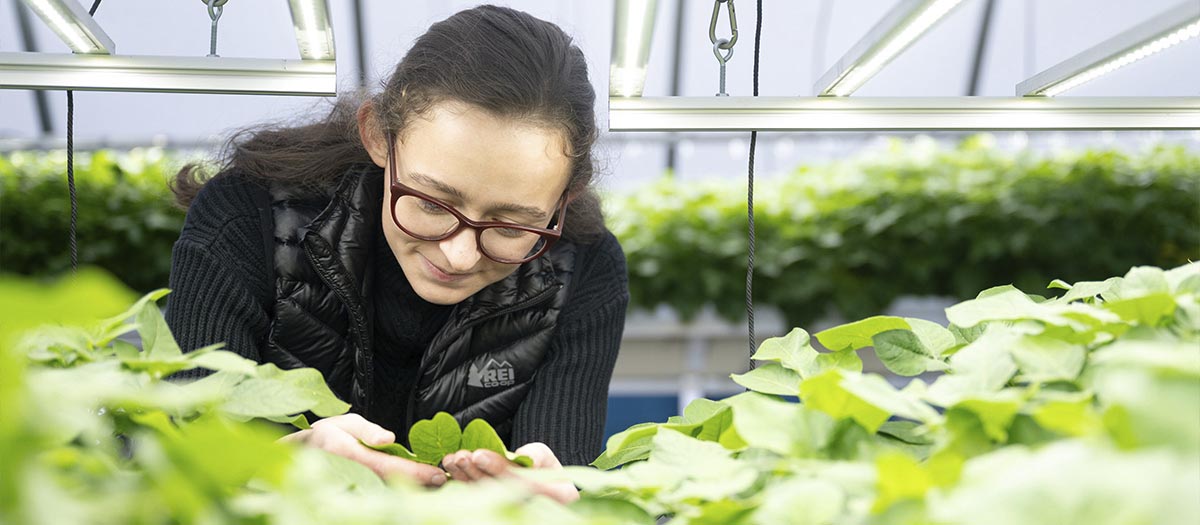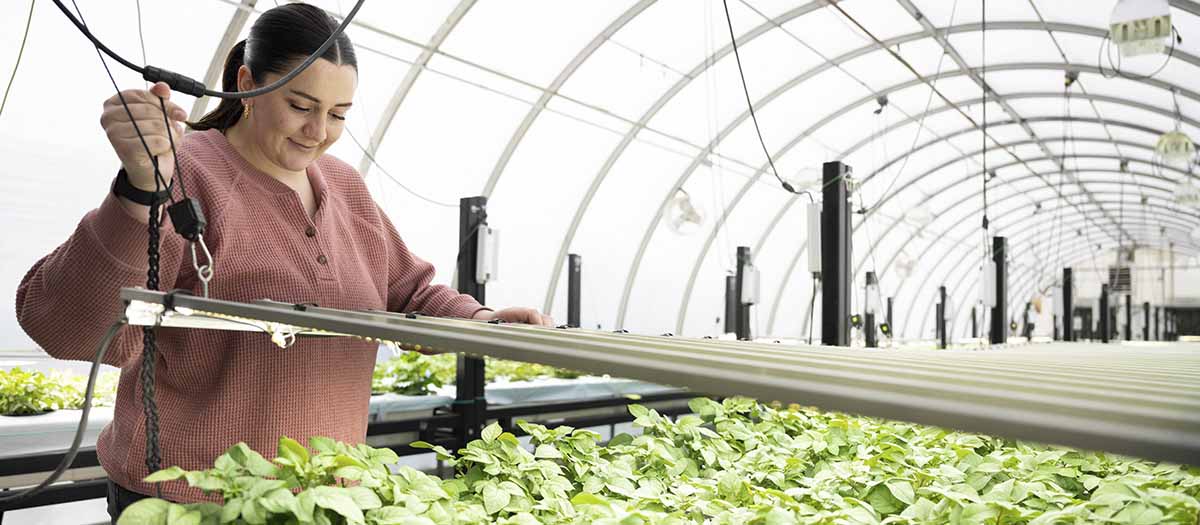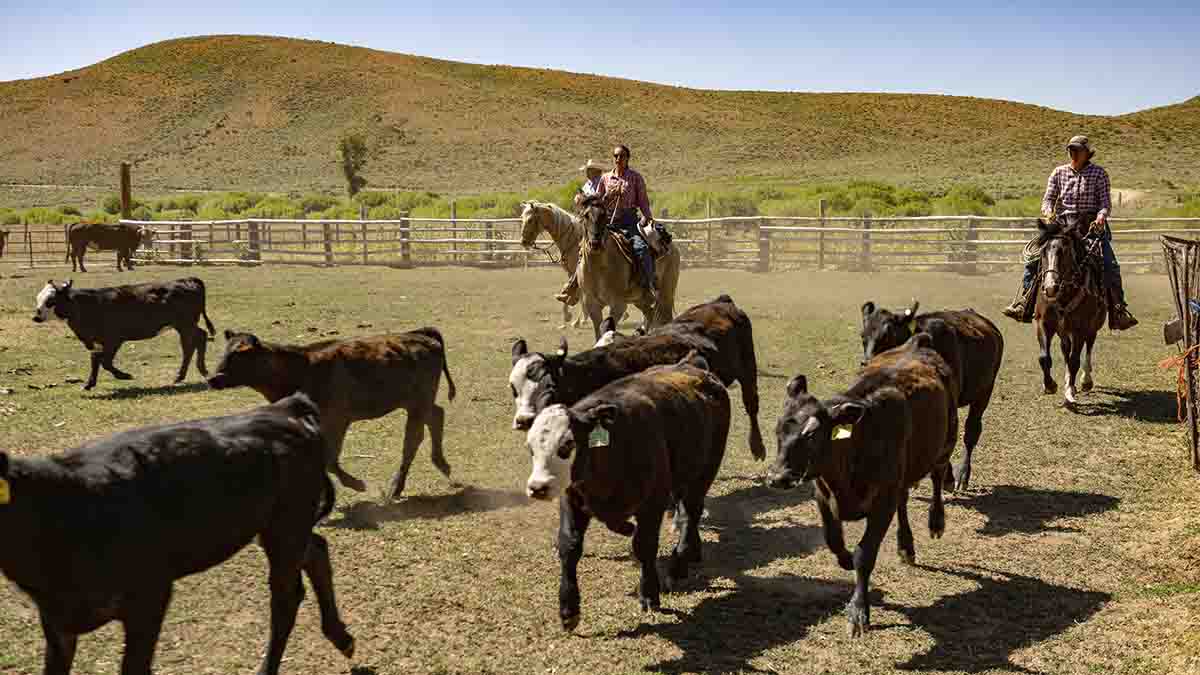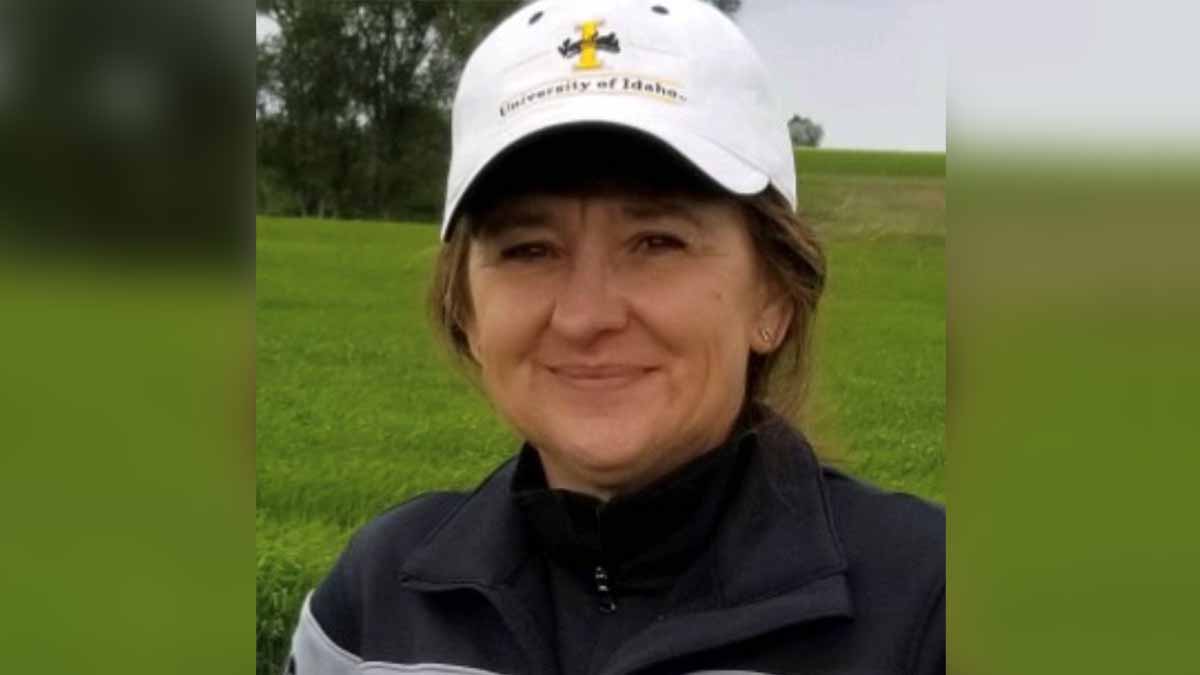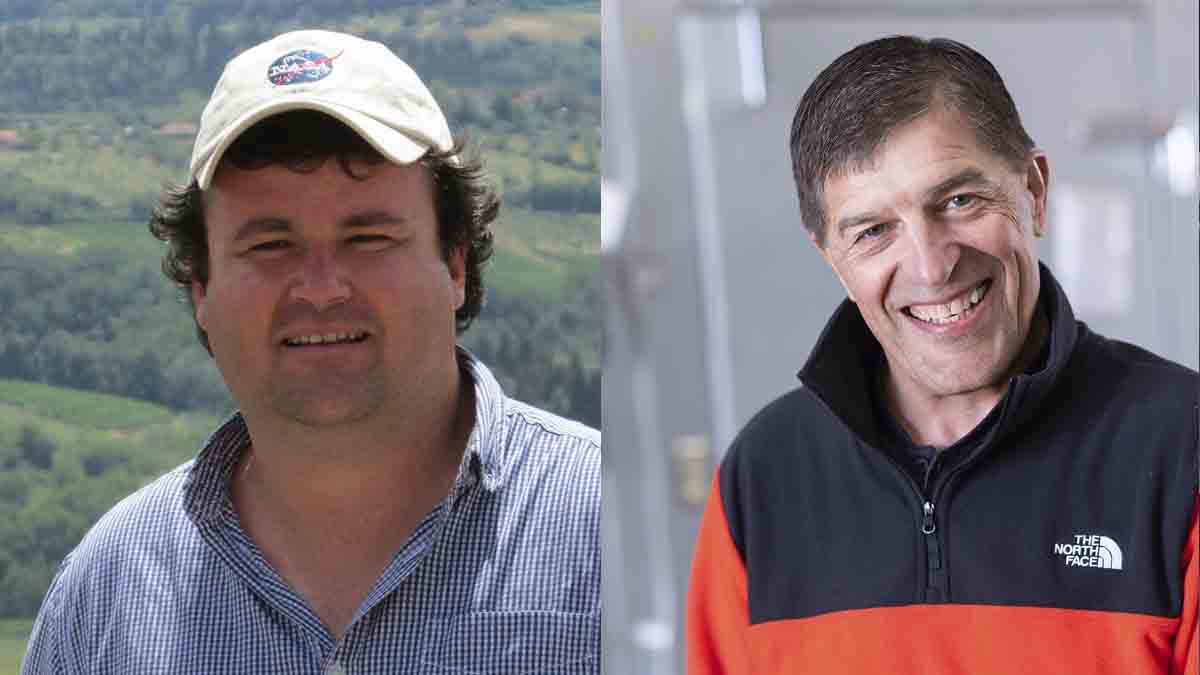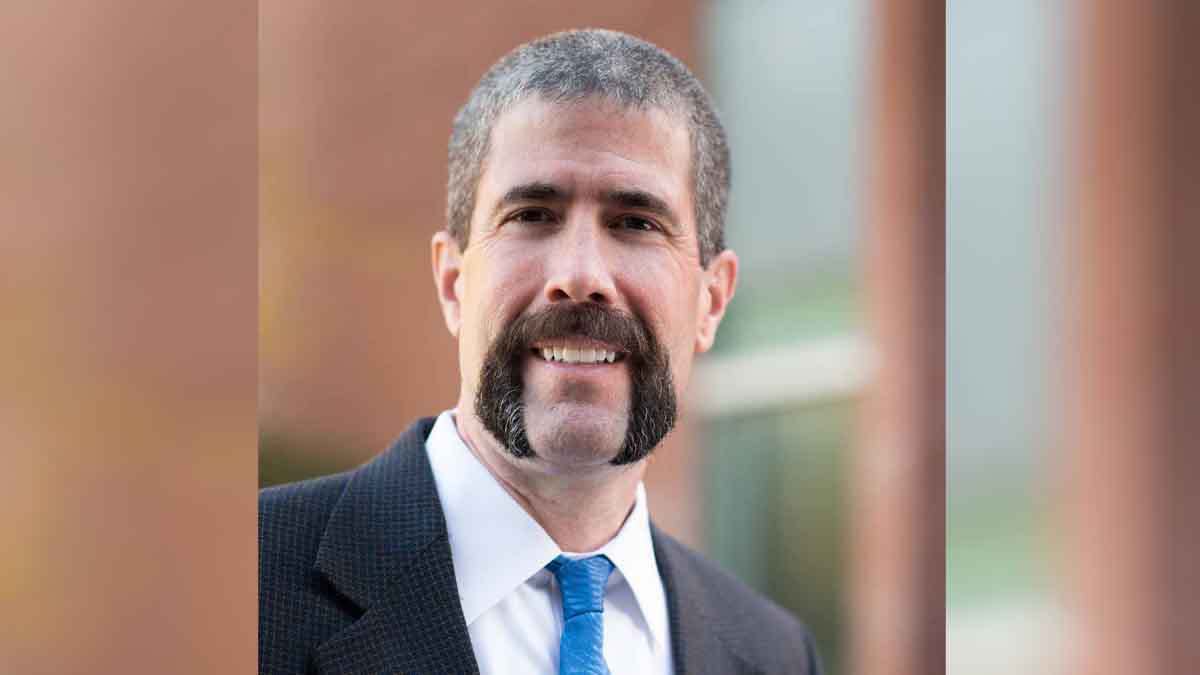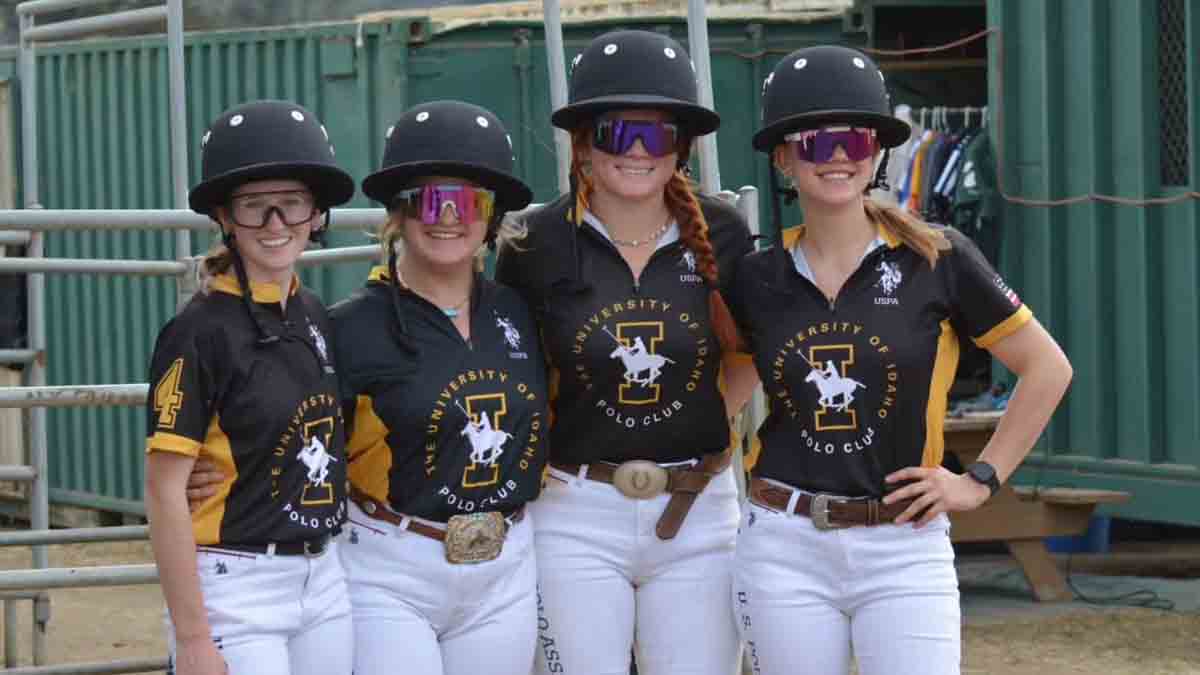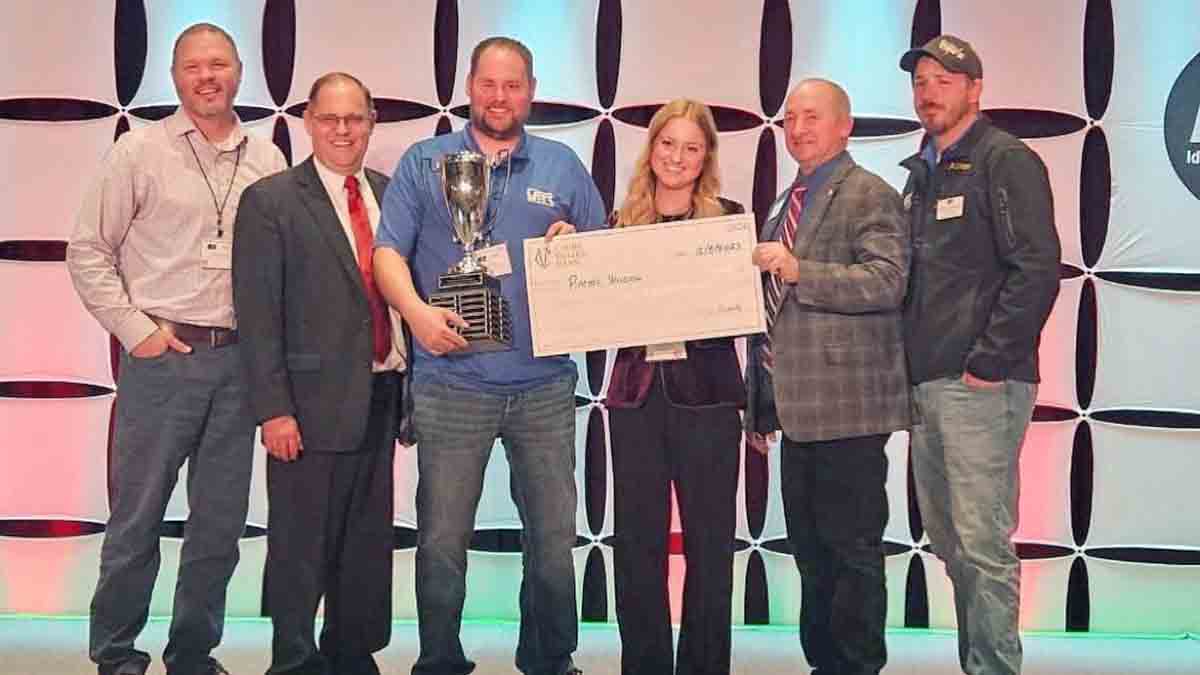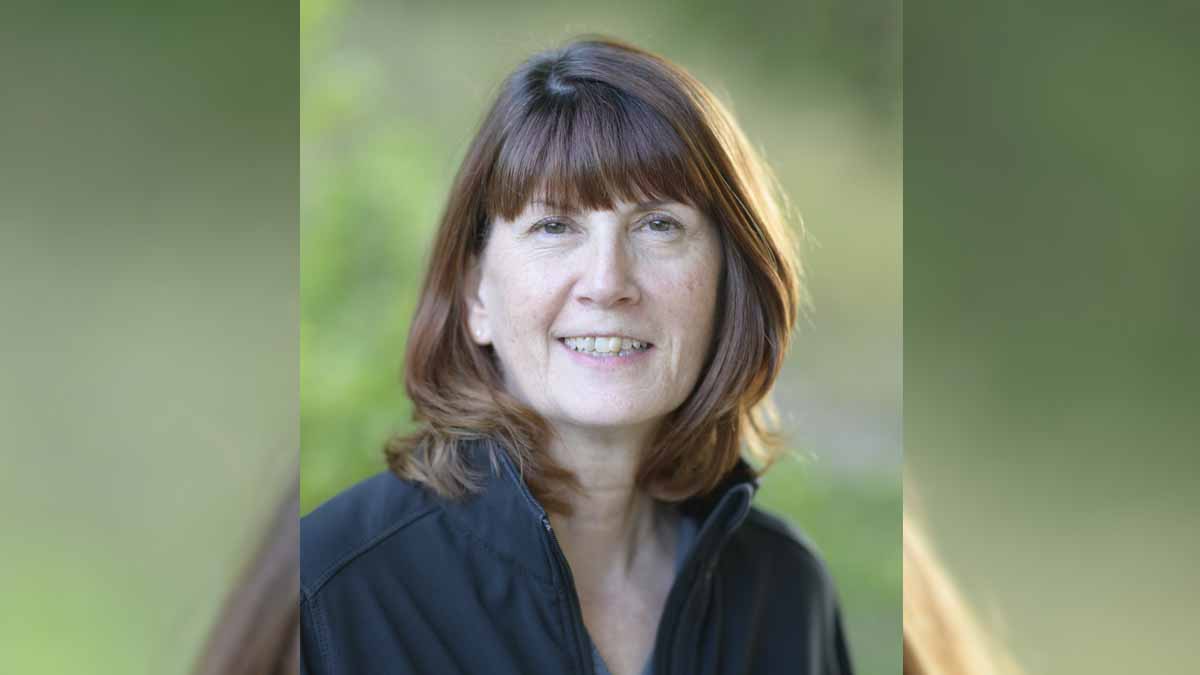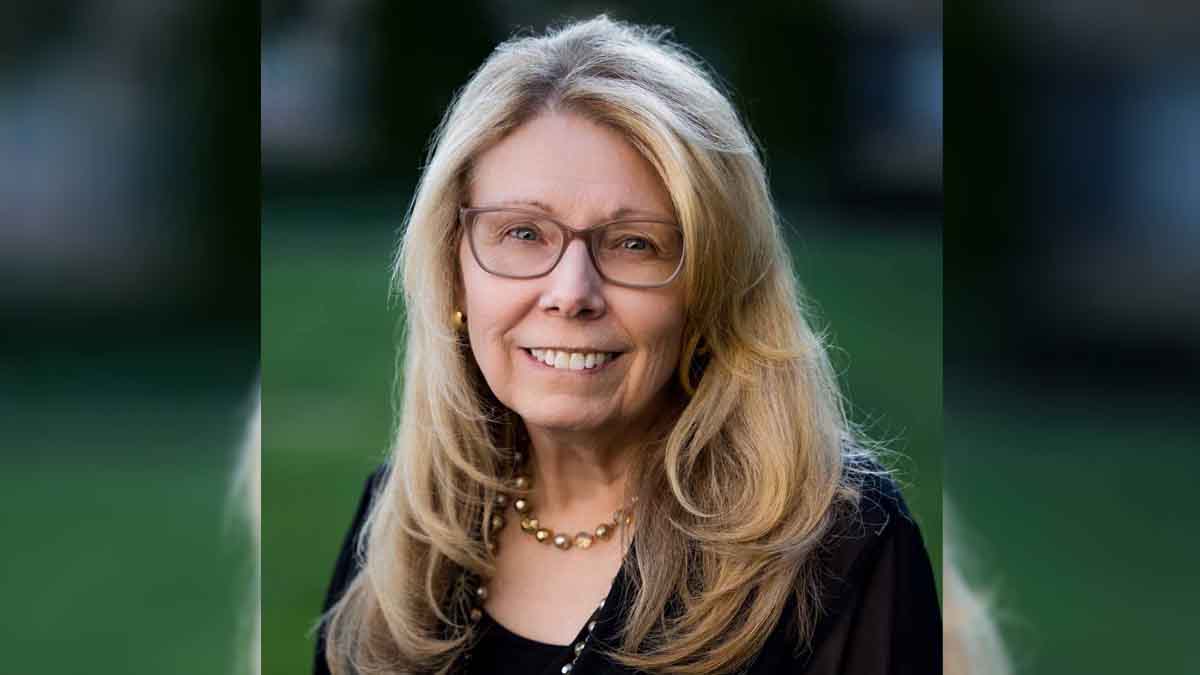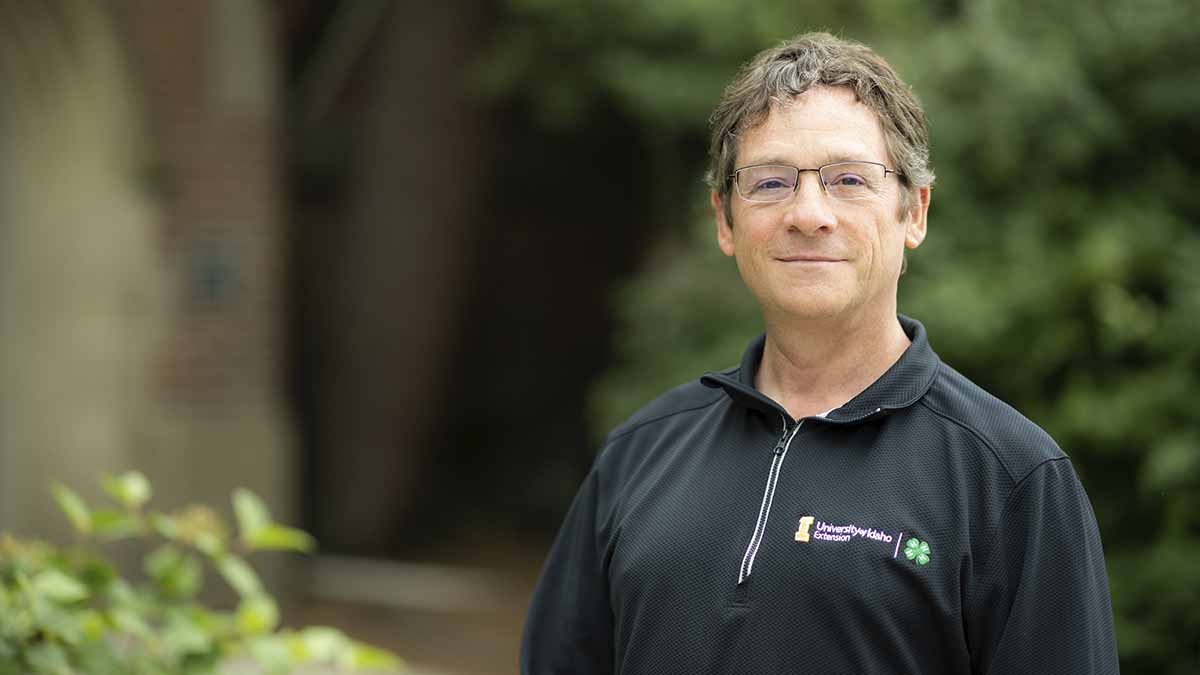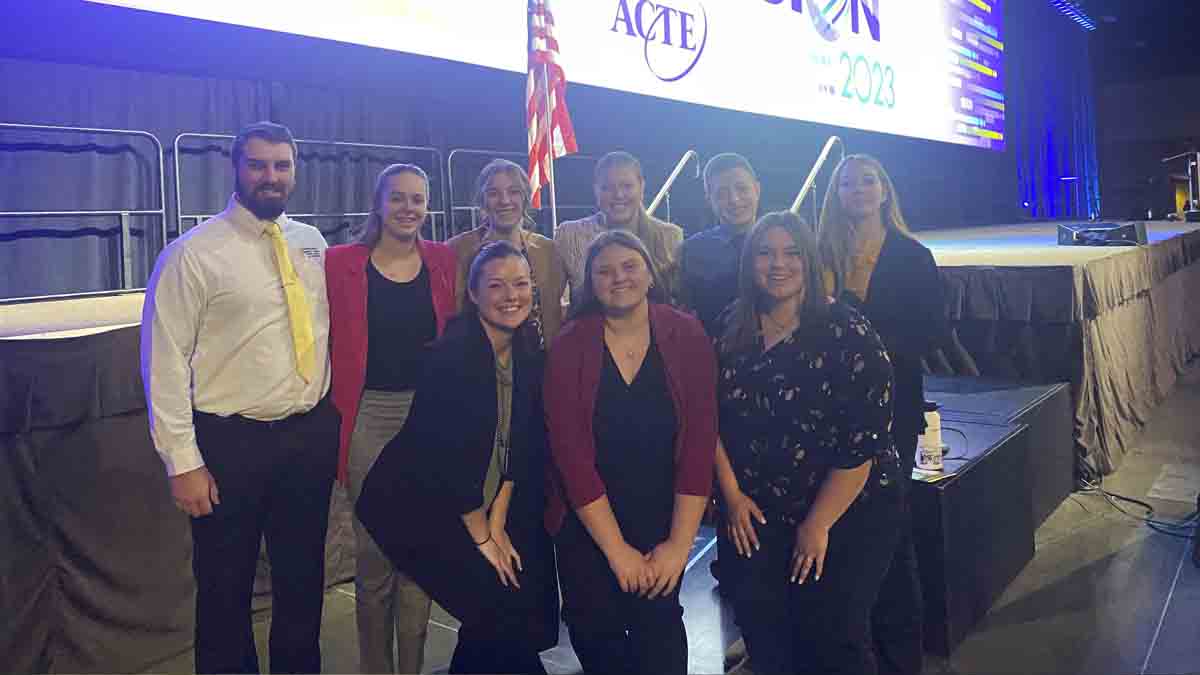Catching Up with CALS — Dec. 13, 2023
Dean's Message — Faculty Gatherings Uniting Vandals
University of Idaho faculty routinely drive past our gorgeous Seed Potato Germplasm laboratory, which opened in March 2022 near the P1FCU Kibbie Dome. Few of them, however, know much about the cutting-edge science that occurs inside the facility, which produces disease-free potato germplasm for domestic and international seed potato growers and researchers. About 90% of the potatoes grown in Idaho and 60% of the spuds raised throughout the nation originate from that building. The potato germplasm program ships more than 300,000 disease-free potato plantlets and roughly 2,500 pounds of mini-tubers throughout the world each year to seed potato growers and researchers. Thanks to a new university tradition launched by the Office of the Provost and Executive Vice President, nearly 100 faculty members representing several colleges had the chance on Dec. 4 to tour the impressive new CALS facility. U of I has started hosting monthly Faculty Gatherings, which give faculty opportunities to interact with peers in different colleges and departments while also highlighting facilities across the campus.
I’m trying to attend as many Faculty Gatherings as possible, and I’ve already found them to be extremely valuable in establishing relationships with colleagues outside of CALS — promoting fellowship and laying the foundation for future collaborations. At the recent CALS gathering, I witnessed tremendous engagement among many faculty members who had seldom interacted previously — some of whom were meeting for the first time. On a personal note, when the College of Education, Health and Human Sciences hosted an Oct. 25 Faculty Gathering, I made new acquaintances with some of their department chairs who regularly interact with CALS faculty involved in training future agricultural educators. We often talk about being members of a broad Vandal family, and these gatherings are bringing us together and building camaraderie. They are giving U of I faculty a better understanding of impressive work that may be taking place a stone’s throw away but is, nonetheless, news to all but a select few.
Upcoming Faculty Gatherings are scheduled for Jan. 24 at Albertson Atrium, hosted by the College of Business and Economics; Feb. 27 at the ICCU Arena Alumni Club Room, hosted by the College of Graduate Studies; March 21 at the International Ballroom, hosted by the College of Science; April 17 at the WWAMI Building Foyer, hosted by Idaho WWAMI; and an April gathering at the Idaho Falls Center, hosted by the College of Engineering. I believe it’s important to celebrate accomplishments across campus — not just the wins we achieve within our own college. A new Seed Potato Germplasm laboratory floats all boats on campus and improves the reputation of other U of I programs. So does the impressive new Idaho WWAMI (Washington, Wyoming, Alaska, Montana and Idaho) medical education facility. I look forward to forging new relationships with others in our Vandal family during upcoming Faculty Gatherings, and I encourage CALS faculty to show their support for colleagues in other colleges through strong attendance in these constructive events.

Michael P. Parrella
Dean
College of Agricultural and Life Sciences
By the Numbers
Preliminary results are now in for University of Idaho’s 2022-2023 cereal trials. In Aberdeen, the top yielding hard winter wheat was IDO2006, which yielded 169 bushels per acre compared with an average in the class of 156 bushels per acre in the trials. The top yielding soft winter wheat varieties in the Aberdeen trials were UIL14-211120A and LCS Hulk, which both yielded 164 bushels per acre compared with the average in the class of 144 bushels per acre. In Kimberly, the top yielding hard winter wheat variety was Flathead, which yielded 177 bushels per acre compared with the average in the class of 157 bushels per acre. In Ririe, the top yielding hard winter wheat varieties on dryland were WB4422 and Keldin+11-52-0, which both yielded 46 bushels per acre compared with an average in the class of 38 bushels per acre. The top-yielding hard winter wheat variety under irrigation in Ririe was Flathead, which yielded 159 bushels per acre compared with an average in the class of 133 bushels per acre. The top yielding soft white winter wheat on dryland in Ririe was UIL16-478001, which yielded 42 bushels per acre compared with an average in the class of 35 bushels per acre. The top yielding soft winter wheat under irrigation in Ririe was AP Exceed, which yielded 139 bushels per acre compared with an average in the class of 117 bushels per acre. Results of spring trials will be included in the next issue of Catching Up with CALS.
Our Stories

Positive Yields
When Myla Crites was growing up in Pasco, Washington and thought of her future, she didn’t see herself attending college. She had thought briefly of becoming a nurse, but an experience trying to give her cat a shot cured her of that desire. Since she didn’t have a specific career in mind, she thought college would be a waste of time and money.
When Crites told her mother that she planned to enter the work force after high school rather than attend college, her mother encouraged her to explore what was available before deciding. They discussed Crites’ interests and kept returning to a high school horticulture class she had enjoyed.
Crites didn’t realize that a degree in horticulture was an option. Luckily, her now-husband, Greydon, had decided to attend the University of Idaho for a medical sciences degree. She began exploring options at U of I and discovered the horticulture and urban agriculture degree — exactly what she was looking for.

Fields of Change
Like many college students, Olivia Redmond’s idea of what she wanted her future to look like changed once or twice during her time at the University of Idaho. What didn’t change was her passion for agriculture. She earns her degree in crop management in December 2023 and will begin a career with Consolidated Grain and Barge Co. in Mississippi.
Returning to Her Roots
Growing up in Colorado, Washington and eventually Idaho, Redmond’s parents made sure that she and her younger brother were familiar with agriculture and knew where their food came from. Her dad grew up on a third-generation ranch in Colorado and is now vice president of row crops for Root Agricultural Advisory in Boise. Redmond and her brother would often accompany their dad on visits to farms across the Treasure Valley, Washington and Oregon.
“I’ve had a very large influence of agriculture my entire life,” Redmond said. “Having that passion instilled in me from the very beginning was crucial.”

Student’s Event Promotes 4-H
University of Idaho Extension 4-H Youth Development leaders in the state’s southcentral region are likely to notice a surge in interest in their programs following a recent event Mackay Junior-Senior High School student Micah Winters organized for his senior project.
Winters credits 4-H with helping him make good friends while becoming more confident and more involved in his community. Hoping to share the benefits of 4-H with other youth, he collaborated with UI Extension to host a 4-H Friday event on Nov. 17 for families in Mackay and surrounding communities, featuring STEM activities.
Winters and several volunteers — including many affiliated with 4-H — organized mini workshops appropriate for children from fourth through eighth grades and invited families from Mackay, Butte and Challis to attend. He displayed flyers about 4-H Friday at businesses throughout the three cities. Furthermore, the UI Extension office in Butte County made invitation postcards to be distributed at area schools.
UI Extension sent a Think Make Create Lab mobile makerspace, equipped with arts, crafts and STEM activities. Youth who attended participated in LEGO robotics, yarn art, leather crafting, wildlife identification, computer dissecting and do-it-yourself cars, rotating among the stations.
“I wanted it to be something I remembered and something that would affect kids going to this event that they would remember, as well,” said Winters, who has been active in 4-H both locally and at the state level.
His father purchased snacks for guests. Winters distributed questionnaires asking children if they were previously aware of 4-H and if they were likely to join a 4-H club after learning more through the activities he offered. He also set up an information desk with details about upcoming 4-H events, as well as general information about the program.
“When I first joined 4-H I didn’t have a lot of people in my circle, and I didn’t have a lot of people to talk to. I was a lonely kid,” Winters said. “As I got involved in 4-H there were a lot of opportunities to meet new people and expand my circle. It’s made me a better public speaker and more confident around new people.”
Winters also took the emphasis 4-H places on community service to heart. He and his brother volunteered to move irrigation pipelines for the cemetery. He also helped repaint the lamb barn at the county fairgrounds. He’s been involved in 4-H since he was 8 years old. He got the idea for his senior project from Jeremy Hampton, who is Winters’ mentor and former Sheep Club leader.
Also as part of his senior project, Winters is writing a 10-page paper on the importance of youth organizations, focused on 4-H and FFA. He’s interviewed current 4-H members, including state officers, and adults within his community who participated in 4-H during childhood. Adults he interviewed, including his community’s assistant fire chief, assured him the leadership roles they’ve taken were largely inspired by lessons learned in 4-H.
“A lot of people have said it’s affected their life in a good way and the opportunities it’s brought them have been lifechanging,” Winters said. “It’s just really good to see that people are still using stuff they’ve learned or experiences they had in 4-H now as much as when they first started.”
Winters’ career goal is to earn a degree in automotive mechanics and also open up his own welding shop specializing in irrigation line repairs. Completing a senior project is a state requirement for graduating high school, but not every student puts in as much effort as Winters. He will also give a presentation on his project.
“I think it’s important for young people in rural communities to be able to experience these types of events and to learn that there is more to 4-H than just the livestock and animal husbandry part,” said Charlotte Wells, Winters’ senior seminar teacher. “Micah was able to shed some light on these other aspects of the organization through this event.”
Shaylee Pancheri, a 4-H assistant serving Butte County, was so impressed by the response to Winters’ project that she intends to organize a similar program within her own community. She’s optimistic that some of the Mackay youth who learned about the LEGO Robotics program based in Butte County will register to participate.
“I think for a lot of kids it opened their eyes,” Pancheri said.

Training New Ranchers
A University of Idaho meat science research team has secured a large federal grant to provide training for beginning ranchers throughout the Northwest.
The three-year, $479,000 grant from the U.S. Department of Agriculture’s National Institute of Food and Agriculture will fund a series of regional workshops titled “Beef 101: Pacific Northwest Beginning Rancher Development Program.”
The team’s goal is to host about six workshops serving roughly 180 producers combined per year. One-day workshops will focus on specific issues relating to livestock production. A comprehensive, multi-day workshop will be hosted in late May in Moscow, covering a host of relevant topics, such as livestock breeding, genetic selection, animal health, grazing, land management, diversifying a business, financial planning, beef quality assurance, vaccinations, food safety, beef markets and livestock evaluation.
The U of I team includes Jessie Van Buren, Michael Colle, Lauren Christensen, Meranda Small, Audra Cochran, Brett Wilder and Phil Bass.
Participants in the workshops will have the opportunity to have soil and forage samples from their operations analyzed. The grant will also pair new ranchers with experienced mentors in the industry and will cover site visits, during which experts from the team will go to individual operations to make assessments. A stipend will be offered to the program’s mentors, and scholarships will be available to help participants cover mileage, hotels and other travel costs.
Grant funds will also help Bass and other meat science researchers travel and present at relevant previously existing educational programs, such as Lemhi County’s annual beef school. Furthermore, grant funds recently helped Small travel to provide training to young producers with the Student Idaho Cattle Association. Some funds will be used to purchase teaching tools and props, such as a replica cow used to demonstrate fetal dystocia, which occurs when abnormal fetal size or positioning complicates delivery.
“This is really taking the mission of Extension and just accentuating it, and it’s given us that license to go out and do the job that we were tasked with doing and to be very effective at it,” said Bass, who is principal investigator on the grant.
The Idaho Cattle Association authored a letter of support for the grant, vowing to help recruit beginning producers to participate.
“Everybody on the team has connections with younger producers in the state, so that was one of the targets,” added Van Buren, a UI Extension educator serving Latah County, who had the primary responsibility for writing the grant.
Wilder, an area Extension educator with the Department of Agricultural Economics and Rural Sociology, will present ranch business management tips, such as when to buy or replace heifers, how to set up a small business, how to have a conversation with a lender and how to manage risk.
“It’s a really exciting grant they spearheaded,” Wilder said. “It’s a challenge across agriculture as a whole to get young people involved at a meaningful level. I think we’re going to be able to accomplish a lot.”
Faces and Places
Professor Juliet Marshall, head of the Department of Plant Sciences, will discuss crop resilience and its relationship to the film “Interstellar” prior to a showing of the film at 7 p.m. Dec. 13 at the Kenworthy Performing Arts Center. The film will be shown as part of the Science on Screen series, which features classic, cult and documentary films with introductions by notable figures from the world of science, technology and medicine.
Scientists with University of Idaho’s Parma Research and Extension Center were well represented at the National Allium Research Conference hosted Nov. 29-Dec. 2 in San Antonio. James Woodhall, an assistant professor and Extension specialist of plant pathology, and Mike Thornton, a professor of plant sciences, along with their research teams, combined to present three talks and three posters during conference.
Joseph Dalton, a professor and Extension dairy specialist, is the recipient of the 2023 Edward A. Fiez Dairy Herd Improvement Association Distinguished Service Award. The award is named for Ed Fiez, a U of I emeritus professor and former Extension dairy specialist who played a major role in the growth and development of the Idaho Dairy Herd Improvement Association.
CALS students Holland Baum and EmmaRae Parsons competed as part of the varsity U of I Polo Team at the 2023 Women’s Arena Challenge in California. The team finished in second place.




Rachel Wandell, a sophomore from Meridian studying animal and veterinary science: production, won the Idaho Collegiate Discussion Meet at the Idaho Young Farmers and Ranchers Conference in Boise. She will now compete at the national meet in March, held in Omaha, Nebraska.
Gayle Gleason, academic advisor and peer leader liaison in the Department of Agricultural Economics and Rural Sociology retires on Dec. 28 after 25 years of service to U of I. Gleason has served as advisor for AERS first and second year students in agribusiness and applied economics and was instrumental in starting a professional clothing exchange program in the college for students.
Distinguished Professor Carolyn Hovde Bohach received the 2023 Representative Maxine Bell Education Advocate Award from the College of Southern Idaho Board of Trustees. This award honors individuals who have been diligent supporters of Idaho education and whose lifetime contributions merit recognition.
4-H Youth Development Extension Specialist Tim Ewers retires on Dec. 28 after nearly 25 years of service to U of I. Ewers joined the UI Extension team in August 2005 after serving as a research professor in the College of Education. He oversaw 4-H STEM programs and provided support for program evaluations.
Agricultural education students Tanner Anderson, Elizabeth Bearden, Sophia Cori, Kennedy Cox, Hannah Love, Courtney Marshall, Alec Vineyard, Alissa Whitaker and Shaylyn Young attended the National Association for Agricultural Education Convention in Phoenix, Arizona, Nov. 27-Dec. 1.
Ten CALS students and their faculty mentors were honored at the 2023 U of I Alumni Awards for Excellence ceremony at the end of November. Receiving awards this year were: Abril Correa and mentor Shiyi Chen; Alicia Easterday, Montana MacConnell and mentor Phil Bass; Catherine Ehlers and mentor Amy Skibiel; WendyAnn Fields and mentor Kirsten Pomerantz; Jessica Mayer, Ellie Tesnohlidek and mentor Michael Colle; Chloe McDougal and mentor Chelsey Lewallen; Tess Richardson and mentor Lori Wahl; and Claire Smith and mentor Sonya Meyer.





Events
- Dec. 13 — Science on Screen: Interstellar, 7 p.m., buy tickets, Kenworthy Performing Arts Centre, Moscow
- Dec. 13, 20 — Farm Financial Analysis class, Online
- Dec. 12-14, 19 — Idaho Ag Outlook Seminar, Idaho Falls, Twin Falls, Nampa & Lewiston
- Dec. 19 — Introduction to Quickbooks for Farming and Ranching class, Online
- Dec. 20 — Heritage Orchard Conference, Sandpoint Organic Agriculture Center
- Jan. 15 — Preserve @ Home, Online
- Feb. 17-19 — Know Your Government, Boise
- Feb. 20 — Grand Opening - Idaho Center for Plant and Soil Health, Parma
Now through end of semester — Fill the CALS Food Pantry, donate nonperishable items in the E.J. Iddings Agricultural Science Building, 606 Rayburn Ave., or make a monetary donation online








